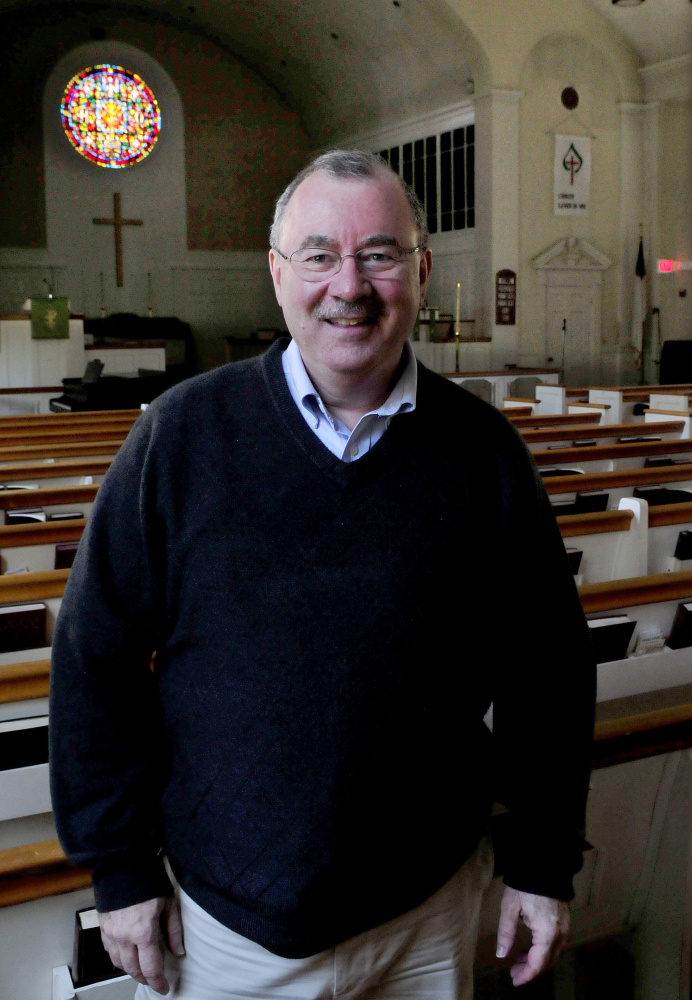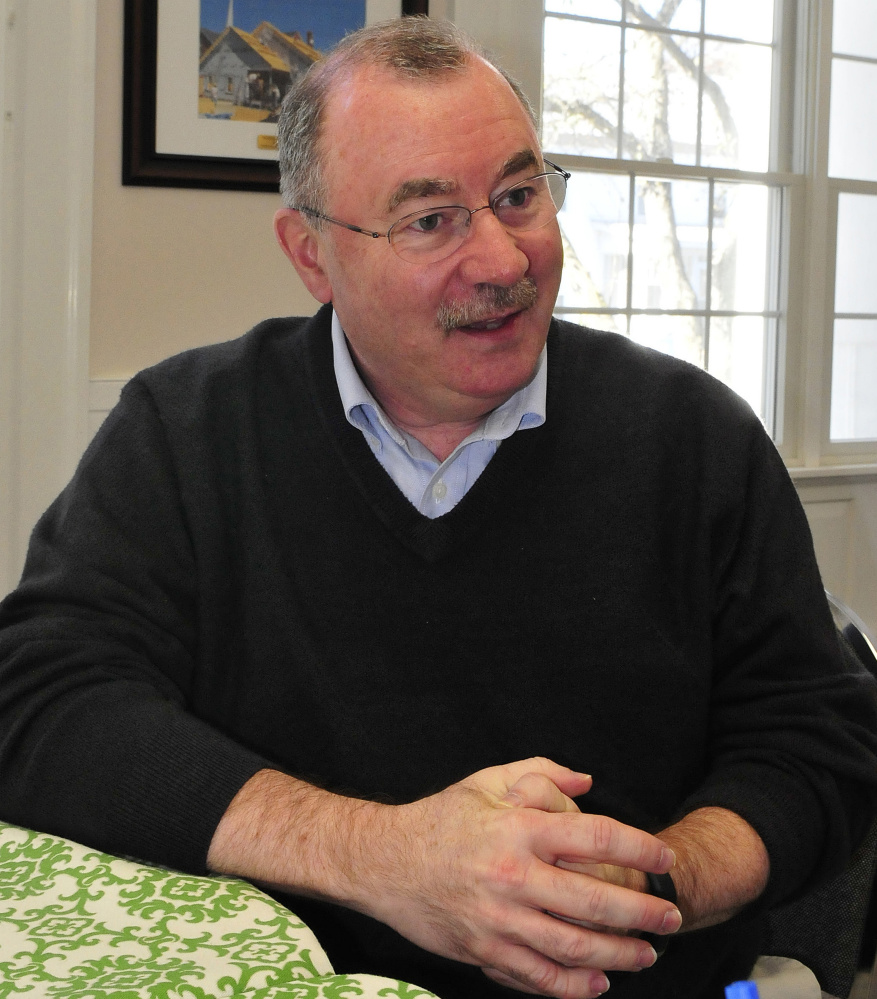WATERVILLE — In the Pleasant Street United Methodist Church, amid high ceilings, rows of wooden pews, a stained glass window above an altar and a cross, the Rev. Thomas Blackstone has done his work for more than three years, work that has now been recognized, work he’s been drawn to virtually all his life, work that is not just about Christian charity, but that is about justice.
The bespectacled Blackstone, cheerful as he spoke in his church on a recent afternoon, recalled getting interested in the Methodist church when he was in high school. The Caribou native first became involved after a mission trip. He decided after that he wanted to be part of a church that he thought was really making a difference.
Though Blackstone has been in the Methodist ministry for 27 years, this year happened to be a standout for him in terms of recognition for his years of service and for making a difference. He was honored twice, once by his peers in New England, the other through a national program.
“I certainly have been privileged to serve congregations interested in community,” Blackstone said. His Waterville congregation considered it a privilege to serve him as well as he was nominated for the Wilbur C. Ziegler Award for Excellence in Preaching presented by the New England Conference of the United Methodist Church and then won the 2017 award.
“Preaching is a living encounter with God,” he said, a way to tell a familiar story in a new way as people may become less attached to stories over time unless they are presented to them in a new way, which some may call outspoken.
“I’d say the goal of preaching is to start with an authoritative text and bring it to life with a community with contemplation and personal struggles,” he said.
At the Methodists’ annual conference in June, where he was honored for his preaching, he delivered a sermon on Matthew 15:21-28, the story of the Canaanite woman, applying it to the modern day situation of one who, in his words, is “the very embodiment of the outsider … born on the wrong side of the racial, ethnic, tribal line” and then describing the response to the outsider as one that sets aside scripture and policy to embrace not charity, but justice, particularly when racism and white privilege get in the way of what he calls discipleship.
Blackstone, whose sermons are recorded and distributed as a weekly podcast, said preaching is a way to take the ancient spiritual texts and scriptures and to modernize them for a congregation. It brings an authoritative text to life, he said.
Blackstone was also awarded a competitive grant that will allow him to take a leave from his church next summer to travel, study and reflect on his faith.
Usually pastors take a leave from their clerical duties every decade or so, Blackstone said, but he hasn’t taken one in his nearly three decades of service. Next summer, he’ll get a chance to do so, having won a Lilly Endowment National Clergy Renewal Program grant, funds administered by the ecumenical Christian Theological Seminary in Indianapolis, Indiana. The funding is available to a diverse religious group, including nondenominational organizations, and grants pastors respite from their leadership roles to find renewal experiences.
Blackstone said he’ll be spending his three months doing something he really doesn’t have time for: “I’ll use it to develop a hobby.”
Blackstone will take a photography class next summer and will then tour the midwestern United States and reflect on his spirituality, concluding his tour with a 10-day silent retreat in Colorado.
The capstone retreat, he said, is a form of contemplative prayer focusing on faith in silence, which he hopes will provide a useful experience and perspective to bring back to his congregation. “I’m excited about it,” he said.
As for his decision to take up photography as his new hobby, he said that, too, gets back to preaching. A lot of the work that goes into preaching is verbal, and Blackstone thought photography would be a good skill to have to present a sense of spirituality in a way words are not be able to. He hopes to use that new skill while touring the Midwest, a region he hasn’t seen much of because of the demands of his pastoral duties.
“I think it will be very renewing and I hope a blessing to the congregation,” he said.
Blackstone said the grant also provides funding for another pastor to take over the congregation while he is gone.
The congregation isn’t what it once was, Blackstone said, which is common for United Methodist churches these days. Across the board, the numbers of people attending United Methodist churches have gone down since the heydays of the 1950s, Blackstone said, but his congregation stands at about 100 to 120 on any given Sunday.
Like most other United Methodist churches, he said the Waterville church prides itself on focusing on spirituality and social activism. He said it was an exciting feeling to be able to serve such an inclusive and socially active church as this one.
“Methodism is based on personal and social holiness,” he said, and tends to the soul of the congregation and to service of the larger community.
The church at 61 Pleasant St. is home to the Waterville Area Food Bank, he said, with some members using the food bank to feed themselves and others volunteering there. It is typical for United Methodist churches to serve as community centers and food banks to make a practical difference in their communities.
United Methodist churches have become inclusive to all those who wish to come and hear a sermon or use their services, he said, and on any given Sunday, it’s not uncommon to see someone who is homeless.
“It’s a very active and changing congregation,” he said..
Colin Ellis — 861-9253
cellis@centralmaine.com
Twitter: @colinoellis
Send questions/comments to the editors.





Success. Please wait for the page to reload. If the page does not reload within 5 seconds, please refresh the page.
Enter your email and password to access comments.
Hi, to comment on stories you must . This profile is in addition to your subscription and website login.
Already have a commenting profile? .
Invalid username/password.
Please check your email to confirm and complete your registration.
Only subscribers are eligible to post comments. Please subscribe or login first for digital access. Here’s why.
Use the form below to reset your password. When you've submitted your account email, we will send an email with a reset code.